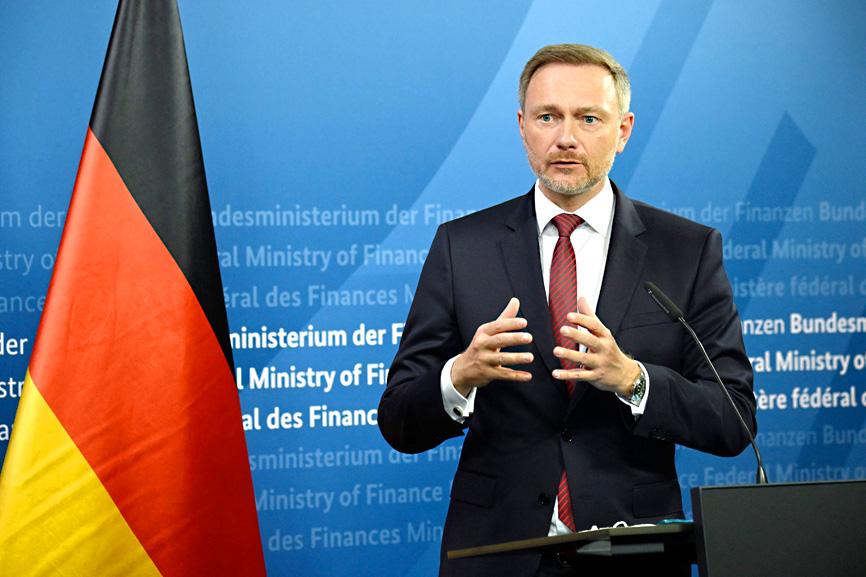Germany needs to “diversify” its export destinations, German Minister of Finance Christian Lindner said yesterday, warning that Europe’s top economy is too reliant on trade with China.
“My concern is that ... we have a strong economic inter-connectedness with China,” Lindner said in an interview with Die Zeit weekly.
“We need to diversify international relations, including when it comes to our exports,” he said.

Photo: AFP
Tensions between China and the West are on the rise following Beijing’s refusal to condemn Russia’s invasion of Ukraine, whereas the EU and the US have imposed sweeping sanctions on Moscow.
Germany’s government came to power in December last year vowing “dialogue and toughness” in its dealings with China, with a focus on human rights after the commerce-driven pragmatism of previous administrations.
“Perhaps the time has come when we should preferentially do business with those who are not only trading partners, but also want to be partners in values,” Lindner said.
China was again Germany’s largest trading partner last year, with the countries exchanging goods worth 245 billion euros (US$268 billion).
A survey by the Ifo economic institute published late last month found that 46 percent of German manufacturers source “key inputs” from China.
Of those companies, “almost one in two” plans to reduce the imports, it said.
Even before the Ukraine conflict, the EU’s relations with Beijing had been battered by disagreements, including over China’s trade coercion of Lithuania over Taiwan and treatment of the Uighur minority.
However, experts say that the bloc remains reluctant to go too far in pressuring Beijing at a time when soaring energy prices and inflation are already causing major economic pain.
Separately, European businesses operating in China are struggling to cope with COVID-19 lockdowns that are hurting production and threatening supply chains.
The EU Chamber of Commerce in China at a media event yesterday warned of disrupted output.
Chamber president Joerg Wuttke said that erratic enforcement of China’s “zero COVID-19” rules is making it difficult for firms to adjust operations.
Additional reporting by Bloomberg

MULTIFACETED: A task force has analyzed possible scenarios and created responses to assist domestic industries in dealing with US tariffs, the economics minister said The Executive Yuan is tomorrow to announce countermeasures to US President Donald Trump’s planned reciprocal tariffs, although the details of the plan would not be made public until Monday next week, Minister of Economic Affairs J.W. Kuo (郭智輝) said yesterday. The Cabinet established an economic and trade task force in November last year to deal with US trade and tariff related issues, Kuo told reporters outside the legislature in Taipei. The task force has been analyzing and evaluating all kinds of scenarios to identify suitable responses and determine how best to assist domestic industries in managing the effects of Trump’s tariffs, he

TIGHT-LIPPED: UMC said it had no merger plans at the moment, after Nikkei Asia reported that the firm and GlobalFoundries were considering restarting merger talks United Microelectronics Corp (UMC, 聯電), the world’s No. 4 contract chipmaker, yesterday launched a new US$5 billion 12-inch chip factory in Singapore as part of its latest effort to diversify its manufacturing footprint amid growing geopolitical risks. The new factory, adjacent to UMC’s existing Singapore fab in the Pasir Res Wafer Fab Park, is scheduled to enter volume production next year, utilizing mature 22-nanometer and 28-nanometer process technologies, UMC said in a statement. The company plans to invest US$5 billion during the first phase of the new fab, which would have an installed capacity of 30,000 12-inch wafers per month, it said. The

Taiwan’s official purchasing managers’ index (PMI) last month rose 0.2 percentage points to 54.2, in a second consecutive month of expansion, thanks to front-loading demand intended to avoid potential US tariff hikes, the Chung-Hua Institution for Economic Research (CIER, 中華經濟研究院) said yesterday. While short-term demand appeared robust, uncertainties rose due to US President Donald Trump’s unpredictable trade policy, CIER president Lien Hsien-ming (連賢明) told a news conference in Taipei. Taiwan’s economy this year would be characterized by high-level fluctuations and the volatility would be wilder than most expect, Lien said Demand for electronics, particularly semiconductors, continues to benefit from US technology giants’ effort

‘SWASTICAR’: Tesla CEO Elon Musk’s close association with Donald Trump has prompted opponents to brand him a ‘Nazi’ and resulted in a dramatic drop in sales Demonstrators descended on Tesla Inc dealerships across the US, and in Europe and Canada on Saturday to protest company chief Elon Musk, who has amassed extraordinary power as a top adviser to US President Donald Trump. Waving signs with messages such as “Musk is stealing our money” and “Reclaim our country,” the protests largely took place peacefully following fiery episodes of vandalism on Tesla vehicles, dealerships and other facilities in recent weeks that US officials have denounced as terrorism. Hundreds rallied on Saturday outside the Tesla dealership in Manhattan. Some blasted Musk, the world’s richest man, while others demanded the shuttering of his